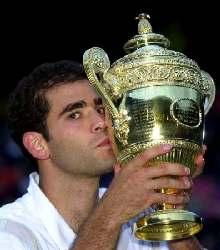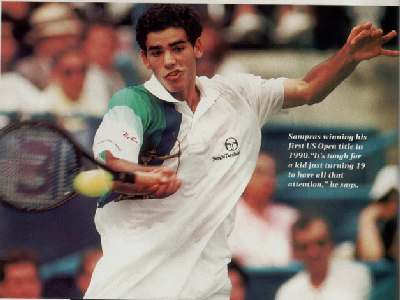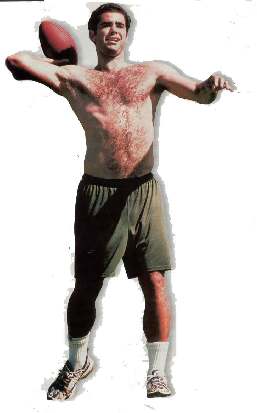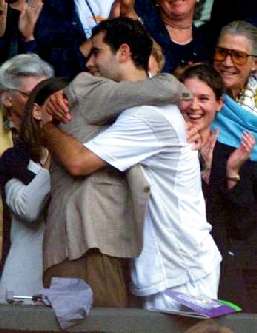 Pete Sampras doesn't
often open up to journalists. The player who,
with his record-breaking 13th Grand Slam
singles title and record-equalling seventh
Wimbledon crown is now more than ever rated
by experts as the greatest tennis player of
all time, guards his privacy with a passion.
But in this interview he reveals that he was
always a solitary child and teenager who
wasn't into dating girls and even now would
never "live loosely."
Pete Sampras doesn't
often open up to journalists. The player who,
with his record-breaking 13th Grand Slam
singles title and record-equalling seventh
Wimbledon crown is now more than ever rated
by experts as the greatest tennis player of
all time, guards his privacy with a passion.
But in this interview he reveals that he was
always a solitary child and teenager who
wasn't into dating girls and even now would
never "live loosely."
He
speaks of his original loathing of grass
tennis courts and the stress of finishing
1998 as No. 1 in the world for the sixth year
running. Also, he owns up for the first time
about a low-iron blood condition which leaves
him debilitated and lethargic in very hot
weather, and his feelings about the
imprisonment of his first coach, Pete
Fischer, for child abuse.
Sampras,
who announced his engagement to actress
Bridgette Wilson just before Wimbledon,
currently lives in a spacious hillside
ranch-style house in Benedict Canyon, an
exclusive suburb of Los Angeles. Since moving
back to the area from Florida he has become
much closer to his parents, who joined him
for the first time ever at Wimbledon this
year. But they were once so poor that his
father had to do two jobs and his mother had
to sleep on a cement floor.
Pete on fame
and fortune
Q.
If you look around this place and then think
back to yourself as a happy-go-lucky,
grinning 15-year-old, did you ever think
you'd wind up having all this?
PS:
Yeah, I assumed I would be successful,
because everybody predicted it for me,
although it would have been hard to forecast
this degree of success. Sometimes, if I
happen to glance at the trophies on the
bookshelf, I'm a bit overwhelmed. But this
level of comfort was never a priority,
because I don't need a lot to be happy. I've
always led a simple life with few
extravagances. The money in tennis never
drove me. When I turned pro, I often shared a
room on the road with my brother, Gus, to
keep expenses down.
Now
I can have all the luxuries and conveniences,
like a jet and nice cars. I know my family
will always be secure. That means a lot to
me. What is a little strange is that when I
first turned pro, I wasn't sure I wanted to
experience this level of success in tennis.
But a few things happened at the start of my
career to make me realise that I did want it.
Q.
Did fame really hit you that hard?
PS:
Oh yeah. When I won the [US] Open in '90, I
wasn't ready. Not as a person, and not as a
tennis player, I just happened to have two
great weeks. That's the only way to explain
it. Otherwise, I was a really green, insecure
kid.

The
morning after I won, I did all these talk
shows. And they made me feel intensely
uncomfortable. It's tough for a kid just
turning 19 to have all that attention. I was
a shy, immature kid and that came across.
Suddenly, everybody always expected me to be
in a good mood. But all I really wanted, like
most 19-year-olds was to find a comfort zone
as a person, to fit in. And fame wasn't my
idea of it. I got overwhelmed trying to
figure out what people wanted from me. I also
saw that what I'd done would affect the rest
of my life, and that was scary. On top of
that, I knew my game couldn't support what
I'd created. After winning that US Open, I
began to feel like a marked man on the court,
and I really wasn't a good enough player yet
to ward it off. I just had a two-week fairy
tale, and then this price to pay - the
responsibility of backing it up.
It
took me a couple of years, pretty much until
I won the US Open for the second time in
1993, to figure it out mentally, and to
develop a good enough game to defend my
position.
Here
I am complaining about winning the US Open.
But if I had to do it all over again, I would
rather have won it later.
Q.
After you lost in the US Open quarterfinals
in 1991, you held a memorable press
conference in which you said you felt
relieved that the pressure was off.
Consequently, a number of players, including
Jim Courier and Jimmy Connors, hauled you
over the coals for it. Did you mean what you
said, or did it just come out wrong?
PS.
I remember that episode well. It was one of
the two or three real media low points for
me. But you know, I just went into that
interview room and said what I felt.
It
was what I was feeling at that time although
it came out sounding like I was happy to
lose. And it reflected that while I had a lot
of talent for the game, I had no real idea
back then of what it took mentally to be a
consistent, Grand Slam-level winner.
Pete on
champion quality
Q.
Do you think that champions are born or made?
In
my case, I'd probably have to say born. At
the most basic level, this game comes easily
to me. I was born with the right genes, I
guess. But, despite being given that talent,
I did have to make myself a certain way,
mentally. And in that sense, I'm made. It's a
little deceptive, maybe because I'm not one
to go to sports psychologist to have
complicated charts breaking down my game, or
to leave no stone unturned in looking for an
advantage. But I never would underestimate
the mental aspects of playing this game. I
just operate a little more naturally.
 Q. You've often
expressed an aversion to over-analysing
things. Is that really your temperament, or
is it a means of self-protection against a
prying world?
Q. You've often
expressed an aversion to over-analysing
things. Is that really your temperament, or
is it a means of self-protection against a
prying world?
It's
me, more than the situation I'm in. It's the
way I look at my life, and my tennis: Keep
things as simple as possible, and shy away
from analyzing every little thing. Don't over
complicate things.
I
know people sometimes have trouble
understanding my tennis, and they try to
figure out why I'm successful. But for me,
it's always been very simple and natural. The
game is something I take for granted. When
I'm playing well...it's easy. And that's how
I've always approached it. I'm the kind of
person whose first reaction in lots of
situations where others might get stressed
out or start agonising is to think, Hey, it's
no big deal, why make it out to be? And
that's my way in my everyday life, too.
Q.
Boris Becker has said that one of the assets
that makes you such a great champion is your
unique talent for keeping the world at arm's
length, so that it doesn't affect your
performance. Is that an accurate insight?
That's
very accurate. Absolutely. I'm pretty good at
separating my tennis from all the other
stuff. I don't let a lot of people into my
life. I don't even have a lot of
acquaintances.
I'm
driven. And that gets lost a little in the
translation, because I appear to be so
casual. But I know what I want, and I'll do
anything I need to do to achieve it.
Tennis-wise, that means I don't care about
headlines. I don't care about how I'm seen.
My priority is to win. I want to hold up that
cup at the end. And over the years, I figured
out what it takes to do that. It works for
me, and that's all I know.
Q.
Does that attitude - that distance you
maintain - rub off in your personal life? Do
those close to you find you hard to read?
I've
heard that from a few different people,
including Paul [Annacone, his coach]. He told
me once that I was an enigma - that when I
walk into the locker room, the other guys
look at me like they can't figure me out. It
certainly isn't something I do on purpose -
like some image or aura I'm trying to create.
But
it's different with my loved ones, my family.
Nobody close to me has ever complained about
me being remote. It does take a while for me
to get to know someone, and at first I may
not show what I'm thinking or feeling. But
when I trust someone, I let the shield down.
I open up.
Q.
Did the extraordinary generation of players
of which you were a part - Andre Agassi, Jim
Courier, Michael Chang - play a part in your
developing into a champion?
I
wouldn't be where I am today if I didn't have
those guys to push me. If you look at the
chronology, you'll see that I was the last to
peak. Michael won the French in 1989. I won
the US Open in 1990, but then I disappeared
while Jim went on a hot streak, winning the
1991 and 1992 French Opens and going to No. 1
in the world. Andre was right in the thick of
it, too.
I
wasn't jealous, but it did bother me a little
to see them jump ahead. It made me wonder if
I'd ever get to that point. That helped my
motivation at a time when I was struggling
with what I wanted out of the game. When I
practised with Jim, it opened my eyes. There
were moments when I thought, 'Yeah, I'm
capable of beating this guy'. Why shouldn't I
accomplish the same things?
Everyone
seemed to set the bar higher for everyone
else. We fed off that. We were all trying to
make our marks, we were all insecure in some
ways, and now I think we can all appreciate
each other's accomplishments because we've
been there ourselves. We know what it takes,
and that creates a special bond among us.
Q.
Does it amuse you that you're so often
characterized as a laid-back guy, just
surfing his talent to the top?
Yeah,
a little bit. There's a competitiveness and
an ability to focus that doesn't come across
because it's well hidden, and that isn't what
sports is about these days. I'm more of a
Bjorn Borg, or a Stefan Edberg, than a John
McEnroe. It probably has to do with how I was
raised and my personality. I'm introspective,
not a screamer.
I
once played a round of golf with David Duval.
As nice as he was to everyone else, I could
see he wanted to play well. Before we played,
he kind of went off by himself, to focus.
I
noted that. I thought. Yeah, that's what I'm
like, too.
Pete on his
parents
Q.
Your parents, Sam and Georgia, are legendary
for staying clear of the limelight. How would
you describe them and how they influenced
you?
 I found tennis for
myself. My parents just supported my interest
in the game. It was a financial strain. For a
while, my dad worked two jobs. [Sam Sampras,
now retired, was both an engineer and a
restaurant owner.] At first, he tried
coaching me by reading books about the game.
But that didn't last too long, and we joke
about it now.
I found tennis for
myself. My parents just supported my interest
in the game. It was a financial strain. For a
while, my dad worked two jobs. [Sam Sampras,
now retired, was both an engineer and a
restaurant owner.] At first, he tried
coaching me by reading books about the game.
But that didn't last too long, and we joke
about it now.
Dad
turned my development over to my first coach,
Pete Fischer. But he was right there, at a
lot of my lessons, and driving me to matches
and tournaments. So he was involved, but not
on-court. He was smart enough to know what he
didn't know.
My
dad is a similar kind of character to me. He
keeps people at arm's length, but once he
trust and likes you, he'll be loyal to the
end. That could take a while, though. It took
my younger sister Marion's husband, Phil
Hodges, a year to break through Dad's shield.
He
also doesn't come off as the warmest of
people on the phone. When my childhood
friends would call, they were always a little
intimidated.
But
Dad's also nervous. Neither he or my mum
could bear to watch the 1990 US Open final on
TV, so they wandered around a shopping mall
near our house in California. They found out
I had won when they passed by an electronics
store and saw a TV tuned to a shot of me
holding up the trophy.
When
I was a junior, I played in higher divisions
than my age. At 12, I'd be playing against 16
year olds. Often, right in the middle of some
tough match, I'd look up at my dad. So what
does he do? He waves goodbye and goes for a
walk! And then I feel like I'm out there
alone. I'm convince that those experiences
shaped who I am today. They made me tough and
independent. That's why you rarely see me
looking at the players' box during a match.
My
mum is the rock of the family. She used to
feed me tennis balls because I was so crazy
about the game, but she doesn't have many
interests of her own beyond her kids.
She
started out dirt-poor, moving to the States
from Greece at the age of 25 without speaking
a word of English, with a family that
included six sisters and two brothers. Those
first years, she sometimes slept on a cement
floor. She became a beautician, and met my
father when a friend of his encouraged him to
check her out at the place where she cut
hair.
Mum
is the caretaker of the family. She has no
education, but a lot of common sense, and she
reads people well. Her talent is her heart,
yet in her own quiet way, she's very strong.
Q.
Your parents normally never come to watch you
play, but this year they attended a Davis Cup
tie and then, for the first time, Wimbledon.
What prompted them to come and watch?
It's
all part of a bigger picture that includes my
moving back to Los Angeles.
I
went off to live in Florida in my early
twenties so I could focus on my tennis. The
plan worked, but tennis began to consum me
and I ended up enjoying the game less because
of it. The time I spent with my family was
mostly on the phone. Now that I'm back in Los
Angeles, I fell I'm back where my roots are.
I see my sister, Stella, three, four times a
week. I drop by my parent's house once a week
or so. It's been more good for my life to be
back here. It's been great.
My
dad sat through all the matches at the Davis
Cup [against the Czech Republic] - a first.
And when he came onto the court after I won
the decisive rubber against Slava Dosedel and
gave me a hug, it felt good. Really good.
I
think they always wanted to be there with me,
but they didn't want me worrying about them.
And I would have - did they get their tickets
okay? Is the hotel any good? That kind of
stuff. The funny thing was that I actually
had to make the point that I really wanted
them there. I had to come out and tell them
how much it meant to me for them to come.
PART
TWO



